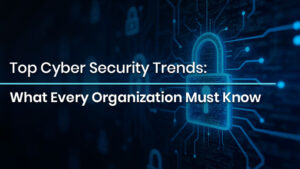
How to Harden Your Infrastructure Using CIS Benchmarks
How to Harden Your Infrastructure Using CIS Benchmarks Introduction As more organizations go faster with their digital transformation, the security and resilience of IT infrastructure
Limited-Time Offer! Get an exclusive 40% OFF on IPSpecialist Premium Monthly & Annual Plans. Use Promo Code: UPSKILLNOW at checkout.

How to Harden Your Infrastructure Using CIS Benchmarks Introduction As more organizations go faster with their digital transformation, the security and resilience of IT infrastructure

Azure Certifications – Validate Your Azure Cloud Skills Introduction Cloud computing has transformed the business landscape, providing scalability, flexibility, and affordability in a way

Top Cyber Security Trends: What Every Organization Must Know Introduction In an era marked by digital transformation, remote workforces, and rapidly evolving threat landscapes,
Table of Contents
In an era where cyber threats are increasingly sophisticated and pervasive, the demand for skilled cybersecurity professionals is at an all-time high. As organizations strive to protect their sensitive data and ensure robust defenses against cyber-attacks, the cybersecurity landscape offers a variety of career paths that promise not only stability but also substantial growth opportunities. Today’s dynamic environment for cybersecurity careers features evolving roles that address new challenges and technologies. Whether you’re an aspiring professional or a seasoned expert looking to pivot, understanding the top career paths in cybersecurity is crucial for navigating this exciting field. This blog explores the top five cybersecurity career paths worth pursuing, providing insights into the roles, required certifications, salary expectations, and upcoming demands to help you make an informed decision about your future in cybersecurity.
Explore the evolving landscape of cybersecurity with IPSpecialist! Access top-tier IT certification training and resources to build and advance your career. From foundational IT courses to specialized training in cybersecurity, Microsoft, AWS, Azure, Cisco, DevOps, and more, IPSpecialist provides a wide range of courses, study guides, and practice exams designed to enhance your expertise. Empower your cybersecurity journey and take the next step in your career—discover the opportunities IPSpecialist offers today!
Overview: Cybersecurity Analysts are the frontline defenders against cyber threats. They monitor network activity, analyze security incidents, and implement protective measures to safeguard an organization’s information systems.
Why Pursue This Path: Cybersecurity Analysts are in high demand as organizations seek to enhance their security posture. This role offers a solid foundation in cybersecurity and opportunities for specialization and advancement.
Overview: Penetration Testers, also known as Ethical Hackers, simulate cyber-attacks to identify vulnerabilities within an organization’s systems before malicious actors can exploit them.
Why Pursue This Path: Penetration Testing is a high-stakes role that involves simulating real-world attacks to improve security. It offers a challenging and rewarding career for those interested in ethical hacking and security testing.
Overview: Security Architects design and implement robust security frameworks to protect an organization’s IT infrastructure from various threats. They play a critical role in shaping an organization’s overall security strategy.
Why Pursue This Path: Security Architects are key to developing and maintaining a strong security posture within organizations. This role requires a strategic mindset and offers opportunities to shape the security landscape of an organization.
Overview: Incident Responders handle and manage cybersecurity incidents, including breaches and attacks. They focus on quickly identifying, containing, and mitigating the impact of security incidents.
Why Pursue This Path: Incident Response is a high-pressure role that involves managing security crises. It offers the opportunity to work on the front lines of cybersecurity and make a significant impact on an organization’s security resilience.
Overview: Cloud Security Specialists focus on securing cloud environments and services. As organizations increasingly move to cloud-based infrastructure, this role is critical in ensuring the security of cloud data and applications.
As cyber threats continue to evolve, the need for skilled cybersecurity professionals remains paramount. Whether you’re interested in analyzing security threats, ethical hacking, designing security frameworks, managing incidents, or securing cloud environments, these top five cybersecurity career paths offer diverse and rewarding opportunities. By pursuing these roles, you can contribute to safeguarding organizations against the ever-growing landscape of cyber threats and advance your career in the dynamic field of cybersecurity.
To become a Cybersecurity Analyst, you typically need a bachelor’s degree in computer science or a related field. Relevant certifications such as CompTIA Security+, CISSP, or CEH are highly recommended to validate your expertise and enhance your job prospects.
To become a Penetration Tester, you should have a strong background in networking And security. Certifications like OSCP, CEH, or CPTE can help demonstrate your skills. Gaining hands-on experience through labs and practical exercises is also crucial for this role.
A Cloud Security Specialist should have expertise in cloud platforms such as AWS, Azure, or Google Cloud and a strong understanding of cloud security practices. Certifications like CCSP, AWS Certified Security—Specialty, or Google Professional Cloud Security Engineer are essential to showcase your proficiency in cloud security.
© 2025 All rights reserved | Privacy Policy | Terms and Conditions | Sitemap | Cookie Policy




